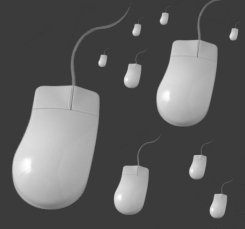Fertility Risk From Laptop Computers
The increasing popularity of laptop computers, together with evidence that elevated scrotal temperature can result in sperm damage, has prompted researchers from the State University of New York to undertake the first study into the effect of heat from laptop computers on scrotal temperature. With the exception of an anecdotal report of genital burns, the effect of portable computers on scrotal temperature when used on the lap has been unknown until now. The researchers findings, reported in the journal Human Reproduction, show that using a computer on the lap increased the temperature of the scrotum by around 2.7°C. Previous studies have shown that increases in testicular temperature of between 1°C and 2.9°C have been associated with a sustained and considerable negative effect on spermatogenesis and fertility.
 "By 2005, there will be 60 million laptop computers in use in the USA
and a predicted 150 million worldwide. Continued improvements in power,
size and price have favoured their increased use by younger people and
laptop sales now exceed those of desktop computers," said lead
researcher Dr Yefim Sheynkin.
"By 2005, there will be 60 million laptop computers in use in the USA
and a predicted 150 million worldwide. Continued improvements in power,
size and price have favoured their increased use by younger people and
laptop sales now exceed those of desktop computers," said lead
researcher Dr Yefim Sheynkin."Laptops can reach internal operating temperatures of over 70°C. They are frequently positioned close to the scrotum, and as well as being capable of producing direct local heat, they require the user to sit with his thighs close together to balance the machine, which traps the scrotum between the thighs."
"The body needs to maintain a proper testicular temperature for normal sperm production and development. Portable computers in a laptop position produce scrotal hyperthermia by both the direct heating effect of the computer and the sitting position necessary to balance the computer. The magnitude of scrotal hyperthermia associated with abnormal spermatogenesis is unclear. Previous studies suggest that 1°C above the baseline is the possible minimal thermal gradient capable of inhibiting spermatogenesis and sperm concentration may be decreased by 40% per 1°C increment of median daytime scrotal temperature," said Dr Sheynkin.
He did not suggest an exact time for safe use, however the study showed that within the first 15 minutes of use, scrotal temperatures increased by 1°C, so it did not take long to reach a point that may affect testicular function. Also, frequent use may cause intermittent temperature rises, which could significantly increase a single heating effect.
"Until further studies provide more information on this type of thermal exposure, teenage boys and young men may consider limiting their use of LC on their laps, as long-term use may have a detrimental effect on their reproductive health," Dr Sheynkin concluded.
Culled from http://www.scienceagogo.com/news/20041109215916data_trunc_sys.shtml

